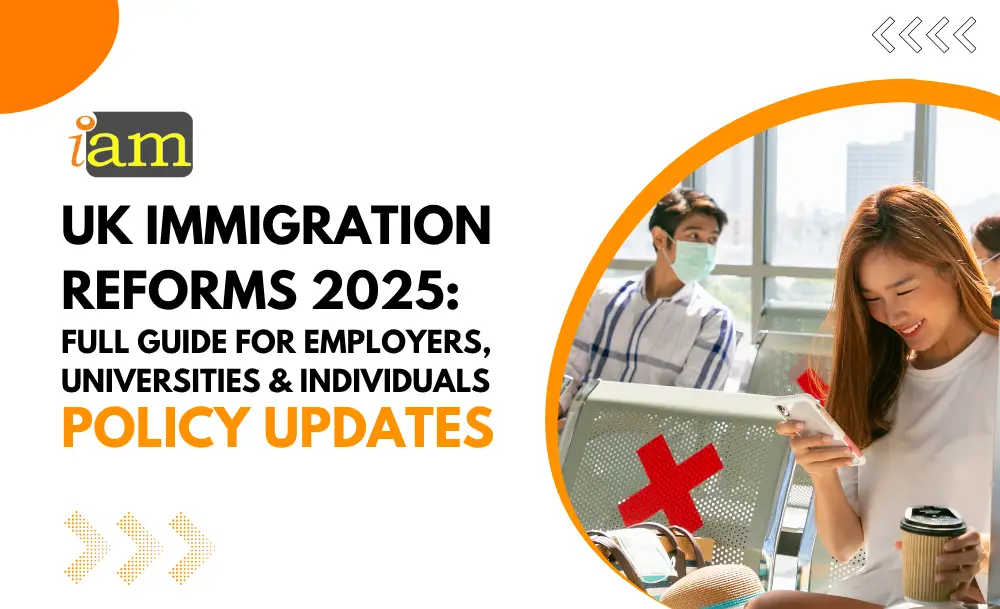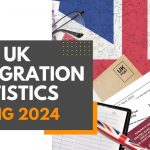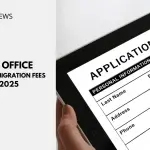UK Immigration Reforms 2025: Full Guide for Employers, Universities & Individuals

UK Immigration Reforms 2025 – What You Need to Know Now
On the 12th of May 2025, the UK Government released another major immigration overhaul. This time targeting employers, education institutions and students, families and settlement routes. From these proposed changes, the government is sending a message: the UK is tightening the rules, and employers, educators, and individuals need to act fast.
Let’s unpack everything, from the return to degree-level work visa requirements to the new 10-year settlement timeline, and turn it into one clear resource. Whether you’re an employer wondering how the salary thresholds will hit your hiring plans, a university managing compliance risks, or an international graduate planning your next move, let’s cut through the noise, so you can stay ahead of the curve.
At-a-Glance: Key Changes in Under 60 Seconds
• Skilled Worker salary threshold rises sharply, limiting sponsorship to higher-pay roles.
• Settlement (ILR) period doubles to 10 years for most work and study routes.
• Graduate Route post-study work visa shortened to 18 months.
• Care-worker visa route closed to new overseas applicants (extensions only until 2028).
• In many ways we are back to pre-Brexit rules with some major changes and tightening coming down the pipeline.
Use the interactive, filterable table below to explore every reform in detail. You can sort by audience group, category, or keyword and export the data for quick in-house briefings.
Summary of May 2025 Immigration Reforms – Restoring Control over the Immigration System
The table below outlines key proposals from the UK Government’s May 2025 White Paper “Restoring Control over the Immigration System” grouped by category. Reforms are listed under Employers, Education Institutions, and Individuals with an emphasis on what is new or changing from previous policy.
| Employers | Education Institutions | Individuals |
|---|---|---|
| Skilled Worker Reforms | ||
| Raised skill & salary criteria for work visa sponsorship: only degree level roles RQF 6+ roles qualify (Regulated Qualifications Framework level 6 or above, up from mid-skill level RQF3), with higher minimum salaries required. | – | Bachelor’s-level job offer and higher salary threshold required for visa (previously the route was open to lower-skilled job offers). |
| Care Worker route closed: no new overseas sponsorship applications allowed (extensions and in‑country switches only allowed until 2028). | – | No new Care Worker visas from outside the UK; existing Care Worker visa holders can extend or switch until 2028. |
| High-skill routes protected: Global Talent, Innovator Founder, etc. remain open. Pledge to maintain or expand specialised visa pathways for top global talent, ensuring businesses can still recruit the “brightest and best” internationally despite tighter rules elsewhere | – | Exceptional global talent can still access dedicated visa streams. So high skilled and exceptionally qualified individuals can still come to the UK. |
| Work & Workforce Strategy Reforms | ||
| Increase to the Immigration Skills Charge (ISC – The levy paid by employers who sponsor migrant workers) +32% to reinvest in UK skills. This is the first rise since 2017 | – | – |
| New mandatory workforce planning strategies requirement for high‑reliance sectors. | – | – |
| Labour Market Evidence Group (LMEG): A new advisory to provide data‑driven guidance on shortages to ensure no industry becomes dependent on immigration. Employers in sectors heavily reliant on migrant labour will be required to develop “workforce strategies” to train and recruit UK residents, as a condition of ongoing international recruitment. | – | – |
| Temporary Shortage List (TSL): A new list to replace current regime with time‑limited access for RQF 3–5 roles with sector plans. Even listed roles will get work visas only on a temporary basis, and only if LMEG deem so | – | Non-degree level roles only available via TSL, subject to genuine critical shortage criteria and plans in place to train UK workers. |
| Incentives to train UK workers and Sanctions for sponsors who under-invest in UK training. eg Employers restricted or barred from sponsoring new skilled worker visas | – | – |
| Study & Education Reforms | ||
| – | Tougher sponsor requirements and Higher baseline standards – Basic Compliance Assessment (BCA) for universities and colleges to hold a student sponsor licence. BCA thresholds increased (95% enrolment, 90% completion). | – |
| – | Red‑Amber‑Green ratings for sponsors – A new traffic-light rating system publicly available to grade education sponsors on compliance. Interventions for at‑risk institutions – If an institution is close to failing compliance metrics, the Home Office will impose a bespoke improvement plan and may temporarily cap the number of new international students it can enroll until compliance is back on track. | – |
| – | Agent Quality Framework: Oversight of recruitment agents. Sign-up required for overseas recruitment agents. Aims to ensure Education institutions take responsibility for agents’ conduct and only work with high-quality agents | – |
| – | Local impact consideration – Universities expected to consider local community impacts (e.g. housing and public services) when expanding international student numbers, ensuring growth is sustainable for the area | – |
| – | Review of Short-Term Study sector and accreditation bodies for stronger oversight. More robust checks will be put in place before an organisation can issue short-term study visas, and during accreditation renewals | – |
| Graduate/Post-Study Reforms | ||
| Graduate Route visa shortened to 18 months (from 2 years). | University competitiveness may decline; international student interest and numbers could cool. | Only 18 months post-study work visa; must secure sponsorship sooner. |
| – | Proposed international student levy (new tax) to fund UK skills training. Financial impact on tuition revenue; may alter fee strategies. | Possible higher tuition or reduced scholarships if levy passes. |
| Language & Settlement Reforms | ||
| B2 English required for work visas (up from B1). | – | A higher level of fluency in English to qualify for a work visa – now B2 English test is mandatory for skilled visas. |
| A new A1 English requirement for adult dependants (including workers and student dependants); A2 for renewals; B2 for settlement. | Student sponsors must inform dependants of new language tests. This added requirement on dependants could affect some students’ decision to study in the UK if their family members have no English ability | Dependants need A1 basic English on entry and A2 on renewal (similar to the requirement for spouses of British citizens) – and B2 for settlement. |
| Increase to the qualifying period to settlement from 5 years to 10 years. Now need 10-year qualifying period for Indefinite Leave to Remain (ILR). Sponsors will need to extend visas longer than under previous rules. | – | ILR now requires 10 years’ continuous residence (exceptions apply), instead of the current 5 year period. |
| Earned settlement: contribution points can reduce the ILR timeline. Individuals who make significant contributions to the UK economy or society can earn the opportunity to shorten their path to settlement and citizenship. | – | Points for economic/community contributions may accelerate ILR. Migrants who contribute more – for example through working in vital sectors, community service, or high earnings – may accumulate points to reduce the 10-year wait for settlement or even expedite citizenship. |
| – | – | Expect a revised civic test and lower naturalisation fees for long-term youths. The government plans to update the study materials/questions and how the exam is administered to better reflect modern British life. |
| Family & Humanitarian Routes | ||
| Skilled refugee route opens limited UNHCR pool to Skilled Worker visas. Employers will gain access to a new talent pool: a limited number of refugees and displaced people (recognised by UNHCR) will be permitted to apply for jobs and work visas under the Skilled Worker scheme. | – | UNHCR-recognised displaced people can apply for skilled roles. Refugees with skills can immigrate via work visas: A new initiative will allow a limited cohort of refugees to come to the UK through the skilled worker route if they have the required skills and a job offer. |
| – | – | 5-year ILR retained for British citizen partners (not 10 years), exempting them from the extended qualifying period; domestic abuse safeguards remain. |
| – | – | New Bereaved-parent route: parents of deceased British children can settle immediately. |
| – | – | Regularisation pathway for long-term resident children and care leavers. |
Why the Government Is Overhauling the System
With increased migration numbers, widening skills gaps and mounting political pressure the Labour government has been forced to redraw the immigration rules. Net migration hit a provisional 728,000 in the year to June 2024 – nearly four-times higher than in 2019 – while GDP-per-capita and labour-market participation stagnated. The May 2025 White Paper frames the reforms as a “fair, selective and controlled” reset that links visas to domestic training and restores public confidence. But if you look closer, it has just reset rules back to the pre-pandemic and pre-Brexit status quo with some new mechanisms and some truly huge changes.
Net migration spikes & political pressure (ONS data)
- Record inflows: ONS figures show net migration peaking at 906,000 in June 2023; still far above the 200-300 k norm1.
- Election backdrop: Ipsos and YouGov polling place immigration among the top three voter concerns ahead of elections, for which the incumbents lost a large number of seats in the recent May elections. We are all aware of the political backdrop of what is happening in the UK.
The UK skills & training strategy (White Paper)
The government argues that decades of easy access to overseas labour have discouraged businesses and public bodies from investing in home-grown talent. The White Paper aim to reverse that trend:
- Labour Market Evidence Group – A new body to merge data from five government/public agencies; DWP, Skills England, the Industrial Strategy Advisory Council, the devolved administrations and the MAC to map real-time shortages.
- Mandatory Workforce Strategies – sectors heavily reliant on migrant labour (like Care and Construction sectors) must publish plans to boost UK recruitment, apprenticeships and up-skilling.
- Higher visa skill bar & Temporary Shortage List – work visas revert to RQF 6+, and lower-skill roles will receive only short-term relief where backed by robust domestic-training plans.
Detailed Breakdown of Each Reform
Skilled Worker & Business Routes
As an employer, the new white paper aims to limit who you can sponsor and increase your costs through levies on hiring international talent.
Higher skill bar (RQF 6+) The skills threshold for Skilled Worker visas to return to the pre-Brexit RQF Level 6 (equivalent to a UK bachelor's degree). It means only roles that are degree-level or above will qualify unless listed on the Temporary Shortage List. Roles previously eligible under RQF 3-5 (e.g. care assistants, chefs, and some trades) will no longer qualify unless exempted under temporary measures.
Increased salary thresholds Base salary requirements have risen significantly to reflect local labour market expectations. The Home Office aims to discourage low-wage international recruitment by making visas viable only for roles offering competitive pay, typically above £38,700 (or higher depending on sector and role).
Immigration Skills Charge (ISC) rise The ISC, which is payable by employers for each sponsored worker, will increase by 32%, reflecting inflation since the charge was introduced. Employers must now budget this into your cost-per-hire models.
New Labour Market Evidence Group This group-comprised of Skills England, DWP, the Migration Advisory Committee (MAC), the Industrial Strategy Advisory Council and devolved bodies will oversee workforce planning and produce guidance on where genuine labour shortages exist. Its role is to inform immigration policy and visa allocations with labour market data.
Temporary Shortage List (TSL) Replacing the Shortage Occupation List (the Immigration Salary List), with the TSL, which introduces a time-limited access for non-degree roles (RQF 3-5). Sectors must submit detailed workforce plans to access it. Inclusion on the TSL will require MAC endorsement and alignment with national industrial strategy.
Study & University Sponsorship
Tougher Basic Compliance Assessment (BCA) International Student sponsor institutions must now achieve a 5% increase of 95% enrolment rate and a 90% completion rate in their BCA metrics. Falling below these thresholds risks licence suspension or revocation. The refusal rate stays the same at 10%.
Red-Amber-Green sponsor rating An amended public-facing compliance score to categorise institutions as Green (fully compliant), Amber (at risk), or Red (non-compliant). This is a change from the current two tier rating.
Agent Quality Framework All institutions using student recruitment agents must now sign up to the Agent Quality Framework. This is supposed to bind education institutions to responsible agent practices and prohibit using agents to bypass integrity checks or inflate application numbers. How this will work in practice remains to be seen.
Short-Term Study (STS) accreditation review The Home Office will tighten oversight of accreditation bodies for short-term study providers. This follows evidence of abuse in the English language school sector. Expect stricter audits and entry criteria for providers.
Graduate Route & Post-Study Work
Post-study work cut to 18 months The Graduate Route, previously known as the Post Study Work Visa, allows two years of unsponsored work after graduation, and is to be limited to 18 months. Students and employers must plan accordingly: graduates need to secure Skilled Worker sponsorship within that window or switch to another category or leave the UK.
Proposed international student levy A new tax is under consideration, targeting higher education providers’ income from international students. Funds would be redirected into domestic skills programmes. The Autumn Budget is expected to confirm rates and implementation.
Language & Settlement
English language upgrades
- Skilled Worker and other economic migrants must now demonstrate B2-level English (previously B1).
- Adult dependents of both workers and students must meet A1 level to enter, and progress to A2 for visa renewal, and B2 for settlement.
10-year ILR track Most visa categories-including Skilled Worker, Student, and Graduate-will now require 10 years of continuous residence before qualifying for Indefinite Leave to Remain (ILR). This replaces the current 5-year norm.
Earned settlement pathway Exceptional applicants can reduce the ILR timeframe by demonstrating “contribution points,” such as working in critical sectors, paying higher taxes, or volunteering in civic programmes. This new pathway will be governed by a yet-to-be-published framework.
Family & Humanitarian Changes
Skilled refugee employment pathway A new route allows UNHCR-recognised refugees living overseas to apply for Skilled Worker roles if they meet the requirements. This replaces ad hoc talent relocation schemes and provides a clear legal route.
5-year ILR retained for UK citizen partners The 5-year route to ILR remains intact for spouses and partners of British citizens. This protects existing family reunification pathways.
New bereaved-parent route If a parent loses a British or settled child, they may now qualify for immediate settlement. This reform adds compassion-based discretion for previously unsupported cases.
Who Wins, Who Loses? Practical Scenarios
Case Study: Engineering Firm Hiring Overseas Talent
WINS (with caveats): A UK-based civil engineering consultancy, struggling to recruit local design engineers, welcomes the higher salary thresholds and skill bar. Most of their international hires already have RQF Level 6 degrees and earn £40,000+, so eligibility isn't an issue.
BUT…
- The 32% hike in the Immigration Skills Charge increases costs.
- Longer timelines for employees to reach settlement may affect retention, especially for those who hoped for ILR in 5 years.
- You must prepare a workforce strategy to maintain access to future non-UK hires.
Case Study: Medium-Sized University Recruiting Master’s Students
LOSING GROUND: A London-based university with a high international student intake will be under pressure.
Key issues:
- Must meet tougher BCA pass marks (95% enrolment, 90% completion).
- Will be publicly rated via the Red-Amber-Green compliance system.
- May have to limit recruitment temporarily if flagged by the Home Office.
- Faces reputational and financial repercussions if caught working with poor-quality overseas agents.
- Likely to be taxed on income.
UNCERTAINTY: The proposed international student levy, if passed, will reduce per-student income. With the Graduate Route now just 18 months, student interest from countries other than the USA, Canada, Australia, New Zealand etc may cool.
Case Study: International Graduate Navigating New Rules
FRUSTRATED, BUT ADAPTING: Ade, a Nigerian graduate in data analytics, just completed her Master’s at a UK university.
Old Route:
- 2 years to work under the Graduate Route.
- Path to Skilled Worker visa or ILR after 5 years.
New Reality:
- Just 18 months to secure sponsorship.
- Must now reach B2 English for future visa stages.
- ILR only available after 10 years, unless she qualifies for contribution-based acceleration.
TAKEAWAY: Alex feels the goalposts have shifted. She’s optimistic about qualifying for a skilled job-but she’ll need to move faster, upskill, and track her visa timeline more carefully than ever. Other countries will also be more attractive than the UK.
Beyond the Headlines: How UK Immigration Reforms Impact Startups
The UK's 2025 immigration reforms have been lauded for attracting top-tier talent. However, beneath the surface, these changes present nuanced challenges for startups, especially those relying on mid-level international professionals.
The Silver Lining: Opportunities for Elite Talent
The reforms introduce positive strides:
- Expanded Innovator Founder Visa: Now more accessible to international graduates, encouraging entrepreneurial ventures.
- Enhanced High Potential Individual (HPI) Route: Doubling the number of qualifying institutions broadens the talent pool.
These initiatives aim to position the UK as a hub for exceptional global talent.
The Overshadowed Middle: Challenges for Startups
While top-tier talent benefits, startups face hurdles:
- Elevated Skill and Salary Thresholds: The requirement for roles to meet RQF Level 6 and higher salary benchmarks excludes many essential mid-level positions.
- Increased Immigration Skills Charge (ISC): A 32% rise in ISC adds financial strain on startups with limited resources.
- Shortened Graduate Route: Reducing post-study work visas from 24 to 18 months pressures startups to expedite hiring decisions.
These factors collectively challenge startups' ability to recruit and retain the diverse talent necessary for growth.
Case in Point: The Startup Dilemma
Consider a London-based AI startup aiming to scale. While attracting a PhD-level researcher is feasible under the new rules, hiring experienced mid-level developers becomes problematic due to increased thresholds and costs. This bottleneck hampers the startup's ability to build robust teams, affecting product development and market competitiveness.
For personalised advice on navigating these reforms, contact our immigration experts.
What is Driving these Changes: High-Skill Routes Expand While Lower-Skill Ones Contract
- Economic versus political logic
- High-skill workers (think AI engineers, biotech researchers, fintech entrepreneurs) carry the promise of productivity gains, R&D spill-overs and higher tax receipts. Granting visas for these roles is pitched as “investment in our future.”
- Low-skill roles (hospitality, warehouse operatives, care assistants) are often framed in populist narratives as “undercutting” British workers, placing pressure on wages or public services. Restricting these routes signals “toughness” on uncontrolled migration.
- Electoral incentives
- Urban, high-growth constituencies (London, Cambridge, Manchester) rally behind tech and financial hubs demanding top-talent visas.
- Swing seats in more economically fragile areas often vote on perceptions of “immigration pressure” in hospitals, schools or housing. Politicians feel compelled to “do something” by tightening low-skill routes.
- Legacy of Brexit and the 2020 PBS overhaul
- To replace free movement, the Government temporarily loosened skill bars to avoid a sudden collapse in labour supply. But now the pendulum has swung back, rebuilding pre-Brexit thresholds for degree-level roles while keeping non-degree pathways on very tight leashes.
Are Any of These Policy Options Any Good?
Rather than a blunt two-band approach (open or shut), the UK can deploy more finely tuned levers:
- Dynamic shortage lists
- The idea of using real-time labour market dashboards (via the Labour Market Evidence Group) to periodically add/remove occupations from a short-term shortage list, avoiding blanket bans that damage whole sectors genuinely seems like a good move. However, the crucial determinant will be how the government utilises and responds to this information in its interactions with employers.
- Bridging low-skill gaps with training
- Tie sponsorship rights to investment in apprenticeships or retraining bonds. Employers who can show local up-skilling get easier access to mid-skill hires.
- Startup & scale-up visas
- Carve out bespoke “scale-up” or “founder” routes that recognise the realities of early-stage firms needing a blend of senior and mid-level hires.
- Digital nomad / remote-work visa – a still missing link
- Attract global footloose talent who bring spending power without competing in low-wage labour markets, via a clear-cut, short-term digital-resident visa.
Crystal-Ball: What’s Likely on the Horizon?
Looking at the political and economic cross-currents, here’s what I’d bet on:
- Greater reliance on data-driven, “just-in-time” shortage lists rather than static occupation bans.
- Enhanced ties between levy receipts and training outcomes, so the extra ISC revenue must demonstrably fund UK apprenticeships or adult‐learning programmes.
- A “Scale-Up” endorsement scheme that lets fast-growing firms sponsor mid-skill staff more flexibly under a special licence.
Frequently Asked Questions (People Also Ask)

Q1. How much is the new Skilled Worker salary threshold?
The minimum salary for most Skilled Worker visas has increased to around £38,700, with higher thresholds in some sectors. Roles below this must qualify via specific exemption routes or the Temporary Shortage List.
Q2. Can care homes still hire carers from abroad in 2025?
Not unless the carer is already in the UK. The overseas Care Worker visa route will now be closed to new applicants, with extensions permitted only until 2028 for those already on the route.
Q3. What English tests do dependents need?
From 2025, all adult dependents (e.g. partners of Skilled Workers or Students) must pass an A1 English test before being granted a visa. For renewals, A2 is required, and for settlement, B2. Test your current English level.
Q4. How do I reach ILR sooner under the “points for contribution”?
The Home Office will introduce a new system where people can reduce the standard 10-year ILR period by earning points for economic and social contributions (e.g. working in key sectors, paying higher taxes, volunteering). Exact scoring is expected by late 2025.
Q5. What happens if my university is rated Amber or Red?
Your institution may be subject to stricter controls, recruitment limits, or even licence revocation. If you're an international student, this could affect your visa or ability to remain in the UK.
Q6. Is the Graduate Route still a good option?
Yes. But with a shorter window. You will now have 18 months after graduation to find a Skilled Worker sponsor. Plan ahead and get career support early in your studies.
Q7. Do these reforms affect EU citizens?
Yes. EU citizens need visas, just like everyone else under the points-based system, unless they have status under the EU Settlement Scheme or other status.
Need Personalised Advice?
Immigration rules are changing fast-and the impact on your family, business or education pathway can be huge.
We’ve helped thousands of employers, students, and families make the right moves at the right time. Let’s do the same for you.
Book your consultation now – speak with a qualified UK immigration lawyer.
Let’s build your plan-before policy shifts again.









